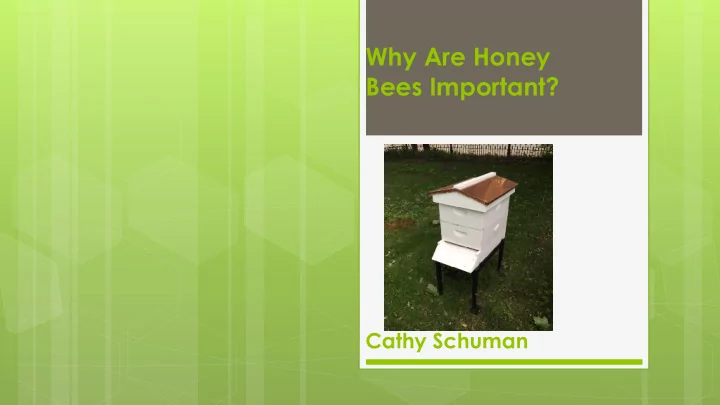

Why Are Honey Bees Important? Cathy Schuman
Objectives Provide information about honey bees 1. Provide information about the impact of honey 2. bee decline on humans Provide information about how to make a 3. direct impact on the survival of honey bees Provide opportunity for questions 4.
Apis Mellifera The western honey bee which can be found in Africa, Europe and central and western Asia – not native to north America Honey bee importation began in early 17 th century - 1621(for honey and bees wax) They are cavity nesters except when humans move them into boxes Honey bees have thrived for 50 million years
Pollination Honey bees are responsible for 80% of pollination and 30% of the worlds food
Pollinator declines in US Continual 30% annual decline (based on commercial beekeepers) 1945 4.5 million colonies 2007 2 million colonies Help…
Breakfast with bees Produce with bees Breakfast without bees Produce without bees Scientific America April 2009
So What is the Problem? Pest and pathogens Intensified land use and loss of habitat Mono-food sources (farms with one crop) Stress Invasive species Pesticides/Chemicals A.A. Vanbergen, 2013. Front Eco Enviorn 11(5):251- 259
Honey Bees Live as a superorganism
Bee Egg Larva Pupa Adult Life Span Queen Days 1-3 Days 4-9 Days 10-15 Day 16 3-5 years Worker Days 1-3 Days 4-9 Days 10-20 Day 21 6 weeks Drone Days 1-3 Days 4-9 Days 10-23 Day 24 3-4 Months Members of Honey Bee Cast Queen Bee Drone Worker Bee (male) (female)
Life of a Honey Bee
Honey Bee Fun Facts Life time of 12 bees = 1 teaspoon of honey Females do all the work Hive = 20-60,000 bees 1 Queen (3-5 years) (up to 2500 eggs/day) ~ 800 Drones (male bees) The rest are worker bees (female)(6-8 weeks in summer)
Honey Bee Facts The honey bee's wings stroke incredibly fast, about 200 beats per second, thus making their famous, distinctive buzz A honey bee usually stays with in two miles of their hive for foraging, but can fly for up to six miles, and as fast as 15 miles per hour It takes one ounce of honey to fuel a bee's flight around the world (National Honey Board). A honey bee visits 50 to 100 flowers during a collection trip
Bees Die After Stinging A honey bee can sting If you get stung, the bee's stinger gets hooked into your skin, and while the bee tries to flee, part of its body tears off, causing it to die (can take up to 20 minutes for them to die, but they only have one stinger A bee sting leaves a tiny drop of venom under your skin which makes the skin turn red and swollen (ice immediately) Pain goes away within minutes Don’t be afraid of bees; they only sting people or animals to protect themselves and their hive If you get stung – flick the stinger out with a credit card or sharp object to avoid pinching all the venom into the skin
Products From The Hive Honey (Only human food produced by insects) Wax Royal Jelly Pollen Propolis (product bees harvest from trees)
Honey Honeybees are the only insects that produce something that humans eat Only food that never goes bad because of its high sugar content Edible honey was found in King Tut's tomb Honey is the only food that includes all the substances necessary to sustain life, including enzymes, vitamins, minerals, and water; and it's the only food that contains "pinocembrin", an antioxidant associated with improved brain functioning To make one pound of honey it would take 556 workers and 2 million flowers
Honey The Centers for Disease Control and Prevention, the American Association of Pediatrics and the National Honey Board have recommended that it not be given to infants under 1 year old, due to botulism spores Honey has also been shown to be an effective cough suppressant
Two Things You Can Do to Make a Direct and Powerful Impact on Honey Bee Survival Plant flowering food sources for bees that will be available throughout the season Don’t contaminate your flowers with pesticides
Getting Connected… LA CROSSE AREA BEEKEEPERS 6 pm on 3 rd Tuesday of most months When: Where: County Administrative Building (Basement Auditorium 430) 212 6 th St N, La Crosse, WI 54601 Women Beekeepers of La Crosse Area When: 9 am on 1st Saturday of most months Where: Root Note, 115 4 th Street South, La Crosse La Crosse Area Beekeepers Regional Conference When: March 14, 2020, 8-4pm Where: Myrick Park, La Cross WI
Contact Cathy Schuman 802-233-2456 cschuman@rollins.edu
Recommend
More recommend